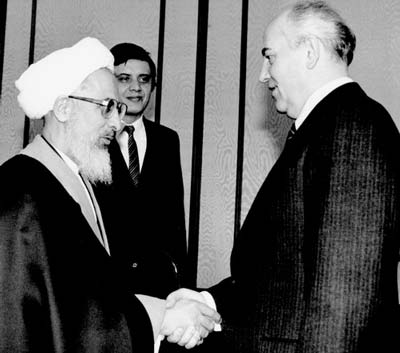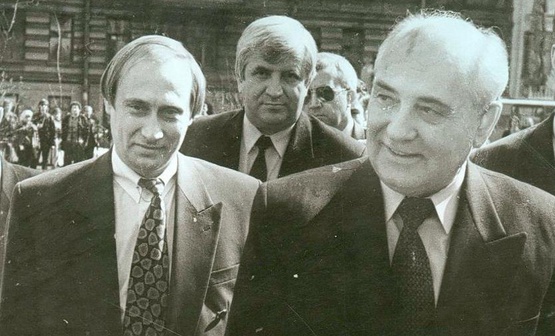 On January 1, 1988, just a year and a half before he passed away on June 3, 1989, Ayatollah Khomeini made a historic move, reaching out the Soviet President Mikhail Gorbachev, in a gesture of anti-imperialist solidarity, despite the long hiatus in relations with communist Russia. This was at a time of war against Iraq and continued subversion of Iran by the US and Israel. He sent President Gorbachev his only written message to a foreign leader.
On January 1, 1988, just a year and a half before he passed away on June 3, 1989, Ayatollah Khomeini made a historic move, reaching out the Soviet President Mikhail Gorbachev, in a gesture of anti-imperialist solidarity, despite the long hiatus in relations with communist Russia. This was at a time of war against Iraq and continued subversion of Iran by the US and Israel. He sent President Gorbachev his only written message to a foreign leader.Ayatollah Khomeini made other prescient gestures in his short and difficult decade as the leader of the Islamic revolution in Iran; in the first place, the transfer of the Israeli embassy to Palestinian representatives, the canceling of recognition of Israel, and the inauguration of al-Quds Day as an annual international holiday on the last Friday of Ramadan. He met with Fidel Castro and other third world leaders, encouraging solidarity against the imperialist foe.
The unprecedented visit of the Iranian delegation to Moscow was a sincere offer of support to the faltering Soviet leader, who had rejected the atheism of the Soviet past. It contrasts with the treatment of Gorbachev's new friend, Reagan, who was at the same time conspiring to subvert the Soviet Union, even as Gorbachev was sincerely reaching out to the hawkish Reagan, offering a generous plan of world nuclear disarmament.
The Ayatollah's warning not to trust the West was being brought home to Gorbachev graphically as the last Soviet troops were retreating into Uzbekistan in 1988. Despite the unilateral withdrawal of Soviet forces from Afghanistan, the US was continuing to arm the insurgents, killing those doomed soldiers as they crossed the Afghanistan-Uzbekistan Friendship Bridge, built in 1982. Imperialism takes no prisoners.
Iran played no part in the US-backed 'jihad' in Afghanistan in the 1980s that brought the collapse of the Soviet Union. Iranian leaders knew that nothing good would come from working in alliance with America.
The Ayatollah knew this well, and was alarmed at the naiveté of Gorbachev. The Ayatollah warned in his letter that the western world was an "illusory heaven", that appeared seductive. But the truth lies elsewhere. "If you hope, at this juncture, to cut the economic Gordian knots of socialism and communism by appealing to the center of western capitalism, you will, far from remedying any ill of your society, commit a mistake which those to come will have to erase. For, if Marxism has come to a deadlock in its social and economic policies, capitalism has also bogged down, in this as well as in other respects though in a different form."
Gorbachev was offended and objected. "This invitation is an interference in the internal issue of a country. Because every country is free for selecting its school of thought." He took the Ayatollah's sincere advice as interference, rather than friendly concern. "Imam Khomeini invited us to Islam; do we have to invite him to our school of thought?"
History has proved the fears that the Ayatollah expressed justified. Gorbachev was standing on the edge of the abyss. Sadly, he scoffed at the ability of the Ayatollah to see the danger and to want to help him. But it was too late by then. Gorbachev had lost control, thinking he was handing power to the people, not recognizing that such a wish was another illusion. The disaster of the collapse of the Soviet Union will reverberate for generations to come, as the Ayatollah predicted.
Gorbachev was operating on a different wavelength when he received the letter from the Ayatollah, trying to cozy up to Israel and the US, again, naively thinking goodwill gestures would be reciprocated. He opened the doors to the emigration of Soviet Jews in 1988 and prepared to renew full diplomatic relations with Israel.
At the same time Gorbachev promised Arafat during a state visit that year that the Soviet Union would recognize an independent Palestinian state if proclaimed, naively hoping that Israel would show gratitude for his generosity by negotiating a genuine peace with the Palestinians. Arafat declared independence in November 1988 and got Soviet recognition the next year, but it was not much consolation. Israel was busy setting up consular offices in Moscow and elsewhere, issuing eventually a million visas to Soviet Jews to come to Israel.
Hundreds of thousands of Russian Jews got instant Israeli citizenship and emigrated, many of them settling illegally in the Occupied Territories, nominally part of a Soviet-recognized Palestinian state. By the end of 1991 when full diplomatic relations with Israel were restored, over 325,000 Soviet Jews had emigrated. Gorbachev’s hope to bring a quick peace to the Middle East were dashed as he was ousted from power, leaving the PLO abandoned and Israel stronger than ever.
Just as the Zionists had hoodwinked Stalin into recognizing Israel, they once again hoodwinked a Soviet leader into re-recognizing it. Instead of increasing Soviet/Russian influence by this dual recognition, all influence was lost, the Palestinians were hurt by the Soviet betrayal, while the Israelis welcomed a million new Jewish immigrants.
Gorbachev's trust was betrayed by both the US and Israel; the Soviet Union collapsed as Soviet Jews fled to the illusory western heaven. The world logically expected a new era free of the threat of war, a peace dividend that would improve the lot of people everywhere, ensuring that the material imperative behind war was eliminated. But the triumph of empire has never led to an end to empire, and strengthening empire has never led to improving the lot of the periphery.
This was clear in the centuries of imperialism, where the periphery was impoverished at the expense of the center. There was no reason to believe a new Great Game of empire could be any different, even Bush I’s postmodern variant, with the US firmly in control. Indeed, the impoverishment of all who are not part of the center/periphery elite has only accelerated.
Today, the US continues to work with the Saudis to destabilize the Iran-Iraq ‘Shia arc’ replaying the endgame against the Soviet Union in Afghanistan, this time with clandestine operations being carried out by the US, Saudis and Israelis—all jealous of Iran’s increasing influence in the Middle East.
US support for Islamists continues to haunt the region, notably in Syria, even as US power ebbs. Following the uprisings in the Arab world in early 2011, Russian President Dmitri
 Medvedev suggested that the revolts in the Arab world were sparked by outside forces scheming to undermine Russia. “I won’t call any names but a whole range of countries, even those we have friendly relations with, have nevertheless been involved in terrorism in the [Russian] Caucasus.”
Medvedev suggested that the revolts in the Arab world were sparked by outside forces scheming to undermine Russia. “I won’t call any names but a whole range of countries, even those we have friendly relations with, have nevertheless been involved in terrorism in the [Russian] Caucasus.”In the ideological vacuum created by the collapse of communism, two Russian ideologies have arisen—Atlantism and Eurasianism, both with roots in the nineteenth century, the latter, a geopolitical reaction to the decadence of the West, articulated persuasively by Nikolai Trubetskoi and Lev Gumilev in the mid-1920s and today by Alexander Dugin.
Russia and Iran are already playing key roles in establishing this new reality, building on the first step taken by Ayatollah Khomeini in 1988. The world's problems will only be solved based on a new geopolitical reality with Russia and Iran at its heart, the kernel of truth in the Ayatollah's historic gesture in 1988.
American Herald Tribune





